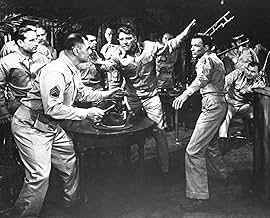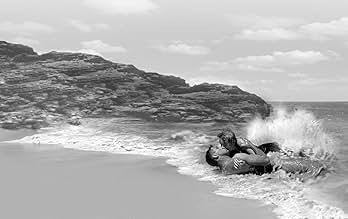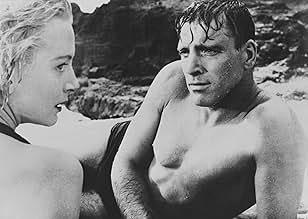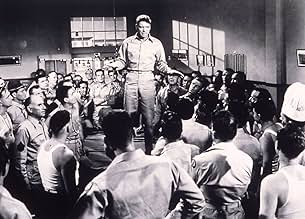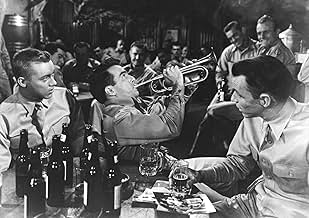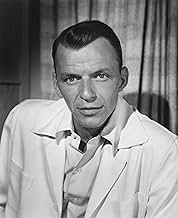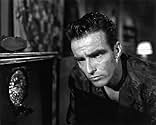IMDb-BEWERTUNG
7,6/10
53.165
IHRE BEWERTUNG
Ein Soldat wird 1941 auf Hawaii grausam bestraft, weil er nicht im Team seiner Einheit geboxt hat, während sich die Frau seines Kapitäns in den stellvertretenden Kommandeur verliebt.Ein Soldat wird 1941 auf Hawaii grausam bestraft, weil er nicht im Team seiner Einheit geboxt hat, während sich die Frau seines Kapitäns in den stellvertretenden Kommandeur verliebt.Ein Soldat wird 1941 auf Hawaii grausam bestraft, weil er nicht im Team seiner Einheit geboxt hat, während sich die Frau seines Kapitäns in den stellvertretenden Kommandeur verliebt.
- Regie
- Drehbuch
- Hauptbesetzung
- 8 Oscars gewonnen
- 26 Gewinne & 9 Nominierungen insgesamt
Claude Akins
- Sgt. 'Baldy' Dhom
- (Nicht genannt)
Vicki Bakken
- Suzanne
- (Nicht genannt)
Margaret Barstow
- Roxanne
- (Nicht genannt)
Empfohlene Bewertungen
James Jone's novel was deemed impossible to put onto the screen {how many times have we heard that one before?}, but nobody told director Fred Zinnerman and the cast of dreams. Troubles with the making of the film were many, the film was thwarted by a censorship requirement that the army not be portrayed as careless and over brutal, and some of the sexual themes from the novel had to be toned down. Zinneman also had to fight a continuous battle with Columbia's head ego tripper Harry Cohn. He interfered with every script that was shown to him, and casting was also a tough thing to achieve with Cohn trying to call the shots. As it turned out we got one of the best composition of actors in one film to have ever graced the screen.
From Here To Eternity is a film about the lives and loves of a number of characters at Schofield Barracks-Pearl Harbor, just prior to the infamous attack by the Japanese that changed WW2. Illicit affairs, friendship, nobility, bravery and cruelty come crashing together in one gigantic lavish production that defines the word classic. Burt Lancaster, Montgomery Clift, Frank Sinatra, Ernest Borgnine, Jack Warden, Deborah Kerr, and Donna Reed all give performances that any other actor would be proud to have given. On another day they all could have won awards such was the strength of performance they all gave. Reed & Sinatra won best supporting Oscars, while Fred Zinneman rightly won for best director to cement the film winning outright for best picture. Yet the film's crowning glory didn't win an award, for to me, Montogomery Clift gives one of the best performances in motion picture history, it's layered to perfection and it's one of those character portrayals that has me involved to the point of exhaustion. One scene in which he plays a bugle lament as tears roll down his face is just stunning, and I know how he feels because I cry along with him to, such is my involvement with his turn as Robert E. Lee Prewitt.
Laced with memorable scenes {the kiss, the bugle lament, Lancaster blasting away at the Japanese planes with machine gun in hand}, and performances to match, From Here To Eternity is essential cinema to be viewed every year and homaged and praised whenever possible. 10/10 in every single respect.
From Here To Eternity is a film about the lives and loves of a number of characters at Schofield Barracks-Pearl Harbor, just prior to the infamous attack by the Japanese that changed WW2. Illicit affairs, friendship, nobility, bravery and cruelty come crashing together in one gigantic lavish production that defines the word classic. Burt Lancaster, Montgomery Clift, Frank Sinatra, Ernest Borgnine, Jack Warden, Deborah Kerr, and Donna Reed all give performances that any other actor would be proud to have given. On another day they all could have won awards such was the strength of performance they all gave. Reed & Sinatra won best supporting Oscars, while Fred Zinneman rightly won for best director to cement the film winning outright for best picture. Yet the film's crowning glory didn't win an award, for to me, Montogomery Clift gives one of the best performances in motion picture history, it's layered to perfection and it's one of those character portrayals that has me involved to the point of exhaustion. One scene in which he plays a bugle lament as tears roll down his face is just stunning, and I know how he feels because I cry along with him to, such is my involvement with his turn as Robert E. Lee Prewitt.
Laced with memorable scenes {the kiss, the bugle lament, Lancaster blasting away at the Japanese planes with machine gun in hand}, and performances to match, From Here To Eternity is essential cinema to be viewed every year and homaged and praised whenever possible. 10/10 in every single respect.
I really enjoyed this film. Frank Sinatra walked away with the Oscar, but I thought Montgomery Clift's performance was the standout. I know they weren't competing against one another, but if any actor were to win an Oscar I would have preferred Clift. Lancaster and Kerr gave the other great performances. I liked the interaction between Clift's and Lancaster's characters, particularly in the scene when Lancaster is telling Clift he could avoid fatigue duties 'if he were smart'. Clift replies 'Yeah, but I ain't smart', and Lancaster says 'I know, I know but if you were...'
I thought the best parts of this film came from the great acting of Kerr, Lancaster and Clift. It may suffer from being called a classic, making people's expectations high, but I thought it was very enjoyable.
I thought the best parts of this film came from the great acting of Kerr, Lancaster and Clift. It may suffer from being called a classic, making people's expectations high, but I thought it was very enjoyable.
The folks who made PEARL HARBOR should have done their homework on how to bring a personal romance into a historical event. This film should have been at the top of their list.
The Pearl Harbor attack is the climax of the film as well as of the various intricate human relationships in the film. This is a classic piece of romantic history, and the beach scene is probably one of the most erotic ever done -- all the more impressive because it has no nudity.
This is a real saga of human passion and how it is affected by history. Whether you see PEARL HARBOR or not is up to you. But definitely see this film.
The Pearl Harbor attack is the climax of the film as well as of the various intricate human relationships in the film. This is a classic piece of romantic history, and the beach scene is probably one of the most erotic ever done -- all the more impressive because it has no nudity.
This is a real saga of human passion and how it is affected by history. Whether you see PEARL HARBOR or not is up to you. But definitely see this film.
In hindsight, this 1953 classic doesn't seem as much a military drama as it does a highly charged soap opera, which shouldn't come as a surprise given that master filmmaker Fred Zinnemann ("the Nun's Story") was at the helm. The veteran director upended the western genre just a year earlier with the Gary Cooper classic "High Noon", and he places the same incendiary focus of character over action here, that is, until the inevitable climax which uses the Japanese attack on Pearl Harbor as a catharsis for the characters' dilemmas now dwarfed by the coming world war.
Based on James Jones' epic novel, screenwriter Daniel Taradash manages to reduce the complexity of the book's themes without trivializing them, and then-offbeat casting enhances the movie immeasurably. Set on a U.S. Army base in Hawaii in the months leading up to the attack, the focus is on two men, both dedicated to the military with no aspirations to become the officers they have grown to detest. One is Private Robert E. Prewitt, a talented boxer (and bugler) who refuses to fight on his regiment's team since blinding a sparring partner. The other is First Sergeant Milton Warden, a take-charge, professional soldier who earns the trust of his men even as he kowtows to his weak-willed commanding officer.
Life in the barracks is fraught with adversarial personalities, chief among them Private Angelo Maggio, Prewitt's loudmouthed best friend, and Staff Sergeant "Fatso" Judson, the sadistic stockade warden. Both Prewitt and Warden meet women who seek to change their lives. Prewitt finds cynical nightclub "hostess" Lorene at a brothel masquerading as a social club, while Warden embarks on a passionate affair with his commanding officer's wayward wife Karen. Burt Lancaster is well cast as Warden, and he brings surprising nuance to his character's clandestine encounters with Karen. However, it's Montgomery Clift - despite looking too slight to be genuinely believable as a boxer - who transcends his loner role by playing off his innately sensitive nature to portray a man who will never sacrifice his honor despite how dire the consequences. Well within his comfort zone, Frank Sinatra's turn as Maggio is small but impactful.
Still two years away from "Marty", Ernest Borgnine makes Judson's malevolence palpable in just a few scenes. Deborah Kerr submerges her Scottish accent and previous lady-like demeanor to reveal the embittered, sexually assertive side of Karen without sacrificing any of the character's vulnerability. The legendary, much-parodied beach scene with Lancaster still sizzles after all these years. Similarly, Donna Reed foregoes her good-girl image (epitomized by her memorable turn as Mary Bailey in "It's a Wonderful Life") to play the sultry, delusional Lorene. The 2003 DVD comes with a small set of extras - a three-minute making-of retrospective short, a nine-minute collection of on-set footage and interviews from a documentary entitled "Fred Zinnemann: As I See It", and the original theatrical trailer. The best extra is the commentary track from Tim Zinnemann (the director's son) and screenwriter Alvin Sargent ("Spider-Man 2"), who had a small role in the movie.
Based on James Jones' epic novel, screenwriter Daniel Taradash manages to reduce the complexity of the book's themes without trivializing them, and then-offbeat casting enhances the movie immeasurably. Set on a U.S. Army base in Hawaii in the months leading up to the attack, the focus is on two men, both dedicated to the military with no aspirations to become the officers they have grown to detest. One is Private Robert E. Prewitt, a talented boxer (and bugler) who refuses to fight on his regiment's team since blinding a sparring partner. The other is First Sergeant Milton Warden, a take-charge, professional soldier who earns the trust of his men even as he kowtows to his weak-willed commanding officer.
Life in the barracks is fraught with adversarial personalities, chief among them Private Angelo Maggio, Prewitt's loudmouthed best friend, and Staff Sergeant "Fatso" Judson, the sadistic stockade warden. Both Prewitt and Warden meet women who seek to change their lives. Prewitt finds cynical nightclub "hostess" Lorene at a brothel masquerading as a social club, while Warden embarks on a passionate affair with his commanding officer's wayward wife Karen. Burt Lancaster is well cast as Warden, and he brings surprising nuance to his character's clandestine encounters with Karen. However, it's Montgomery Clift - despite looking too slight to be genuinely believable as a boxer - who transcends his loner role by playing off his innately sensitive nature to portray a man who will never sacrifice his honor despite how dire the consequences. Well within his comfort zone, Frank Sinatra's turn as Maggio is small but impactful.
Still two years away from "Marty", Ernest Borgnine makes Judson's malevolence palpable in just a few scenes. Deborah Kerr submerges her Scottish accent and previous lady-like demeanor to reveal the embittered, sexually assertive side of Karen without sacrificing any of the character's vulnerability. The legendary, much-parodied beach scene with Lancaster still sizzles after all these years. Similarly, Donna Reed foregoes her good-girl image (epitomized by her memorable turn as Mary Bailey in "It's a Wonderful Life") to play the sultry, delusional Lorene. The 2003 DVD comes with a small set of extras - a three-minute making-of retrospective short, a nine-minute collection of on-set footage and interviews from a documentary entitled "Fred Zinnemann: As I See It", and the original theatrical trailer. The best extra is the commentary track from Tim Zinnemann (the director's son) and screenwriter Alvin Sargent ("Spider-Man 2"), who had a small role in the movie.
10nawknek
"From Here to Eternity" contains the best performance delivered by an actor of any gender on celluloid. Montgomery Clift is assertive, funny, tough, sensitive and charismatic in the pivotal role of Robert E. Lee Prewitt, the rebellious loner with the streak of nobility. It is easy to see why James Dean idolized him after seeing his portrayal in the film. It is also a shame modern actors don't mention his name more often when listing their influences. As often noted, he preceded Brando by two years (he first appeared in Red River, released in 1948; Brando bowed in The Men in 1950)and created the arch-type of the 1950's rebel. But due to his intelligence, Clift also informed his characters with a sense of purpose. He didn't simply rebel. For instance, in Eternity, he apologises after an angry outbreak at his girlfriend. Instead of appearing weak, he impressed me all the more for doing so. It makes him appear more mature than the typical rebel. In another instance, when he feels his friend Maggio is being unfairly attacked, he "stares down" the attacker proving he looks out for his friend, another attractive quality. When the non-coms dole out extra punishment to him to force him to box, he refuses to file a complaint but likewise refuses to comply to their demands. Such moments distinguish Clift from other, more typically macho Hollywood leading men of the era and contributed greatly to Eternity's long initial run at the box office and its status as a classic piece of Hollywood cinema. It is time someone set the record straight and restored Montgomery Clift's name to its rightful place in the pantheon of Hollywood's great leading men. For proof, look no further than From Here to Eternity.
Oscars Best Picture Winners, Ranked
Oscars Best Picture Winners, Ranked
See the complete list of Oscars Best Picture winners, ranked by IMDb ratings.
Wusstest du schon
- WissenswertesMontgomery Clift threw himself into the character of Prewitt, learning to play the bugle (even though he knew he'd be dubbed) and taking boxing lessons. Fred Zinnemann said, "Clift forced the other actors to be much better than they really were. That's the only way I can put it. He got performances from the other actors, he got reactions from the other actors that were totally genuine."
- PatzerThe impromptu bugle solo in the club includes notes that only a trumpet could hit.
- Zitate
Robert E. Lee "Prew' Prewitt: Nobody ever lies about being lonely.
- Crazy CreditsOpening credits prologue: SCHOFIELD BARRACKS HAWAII 1941
- VerbindungenEdited from Der 7. Dezember (1943)
- SoundtracksRe-enlistment Blues
(1953)
by James Jones, Fred Karger, Robert Wells
Sung by men in the barracks twice
Played often in the score
Top-Auswahl
Melde dich zum Bewerten an und greife auf die Watchlist für personalisierte Empfehlungen zu.
Details
- Erscheinungsdatum
- Herkunftsland
- Sprache
- Auch bekannt als
- De aquí a la eternidad
- Drehorte
- Halona Beach Cove, O'ahu, Hawaii, USA(Warden and Karen's kissing in the surf scene)
- Produktionsfirma
- Weitere beteiligte Unternehmen bei IMDbPro anzeigen
Box Office
- Budget
- 1.650.000 $ (geschätzt)
- Bruttoertrag in den USA und Kanada
- 36.416 $
- Eröffnungswochenende in den USA und in Kanada
- 18.176 $
- 7. Dez. 2003
- Weltweiter Bruttoertrag
- 36.416 $
- Laufzeit
- 1 Std. 58 Min.(118 min)
- Farbe
- Sound-Mix
- Seitenverhältnis
- 1.37 : 1
Zu dieser Seite beitragen
Bearbeitung vorschlagen oder fehlenden Inhalt hinzufügen



